ARTICLE AD BOX
Mark Savage
Music Correspondent
David Sillito
Culture correspondent

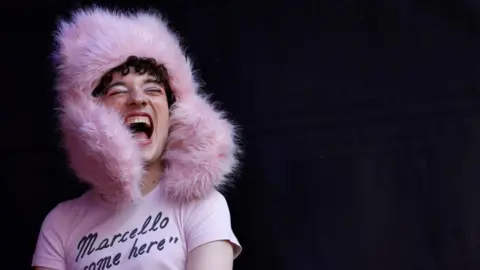 Getty Images
Getty Images
If it wasn't for Nemo, Switzerland wouldn't be hosting this year's Eurovision Song Contest.
Twelve months ago, the singer lifted the trophy for their song The Code, an operatic pop track about their journey to realising they were non-binary.
It was the first victory for a non-binary performer in Eurovision history and the first for Switzerland since Céline Dion won in 1988.
Looking back, 12 months later, the singer says the experience "turned my life upside down, in the best way possible."
"The most important thing was [that] I gained a lot of self confidence in myself as an artist.
"It adds a level of relaxation to the creation process, because I know I can trust my gut when it comes to writing songs and performance."

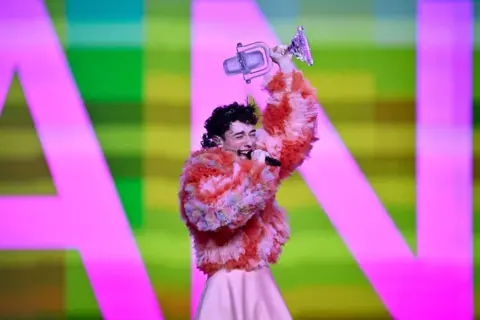 Getty Images
Getty Images
The musician broke the Eurovision trophy in two, minutes after it was handed to them on stage in Malmo, Sweden
After last year's contest, Nemo was vocal in their criticism of the organisers who, they said, didn't do enough to support participants who were caught up in a row over Israel's inclusion.
"I felt very alone," they told BBC News last October, "and I know that some other artists were also feeling that way.".
"I really hope they have things in place for the next year to make sure that part of the whole contest, especially mentally, gets taken care of."
Eurovision responded last December, by introducing a swathe of new rules designed to protect contestants' welfare.
There are more closed-door rehearsals, allowing participants to refine their performances away from the critical eyes of fans and the media.
And, after artists like Bambie Thug accused other countries of filming them backstage without permission, the contest introduced no-filming zones backstage.
"We all feel super safe in that area," French singer Louane told the BBC earlier this week.
"It means when you encounter a blue carpet, you're not allowed to have your phone out to film or take pictures or anything."
The result is a much calmer atmosphere in the Eurovision camp. After the tensions of 2024, the class of 25 have even set up a WhatsApp group to cheer each other on.
"It's such a nice thing to have everybody so supporting each other," says Claude, who is representing the Netherlands.
"Like, if somebody forgot something in their home country, they'd just be like, 'Does somebody have like, a charger?' and the reply would come, 'Oh yes, you can come pick it up at my hotel room'. It's so fun!"
Even so, Nemo worries about the scrutiny the contestants face in Eurovision week.
"There's a lot of expectations," they explain.
"The media at home is like, 'Oh, we're not happy with this entry, it's going to fail.'
"Or they take the complete opposite [approach] of, 'This has to win. And if it's not winning, we're really disappointed.'

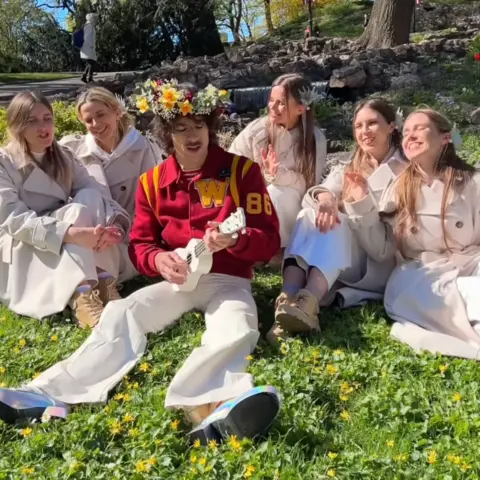 Go-Jo
Go-Jo
Casting rivalries aside, this year's contestants (including Australia's Go-Jo and Latvia's Tautumeitas, pictured) have been hanging out before the competition
Nemo remembers that feeling well.
This time last year, they were the bookmakers' third favourite, but saw off frontrunners Croatia and Israel with a high-risk performance that saw them dancing on a tilted, spinning platform, while hitting improbable high notes for three long minutes.
"I had moments where I was like, 'Please just don't fall. Whatever you do, don't fall,'" they laugh.
"And then I got lucky seven times, because you're rehearsing, then you have the jury show, and it all leads up to the final performance.
"I was like, 'It's gone right seven times. What are the chances that, in this moment, it will go wrong?'
"So I trusted in the moment, and everything went fine, but I could have been the biggest loser in the history of Switzerland!"

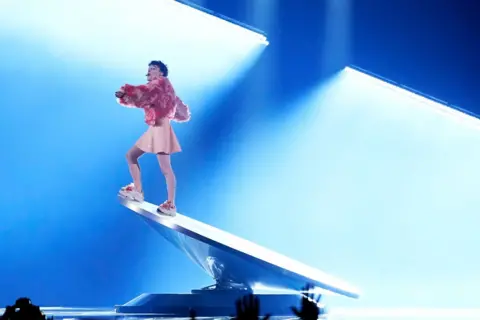 Getty Images
Getty Images
Nemo gave one of the most memorable - and risky - performances of 2024
Instead, they topped the table and lifted the trophy... before promptly breaking it in two.
The singer says it's "special" to see the contest back in their home country after a gap of 36 years.
"They're doing an amazing job. I love that people are getting to know Switzerland.
"They're like, 'Okay, it's not just all mountains and and cows'."
The 25-year-old will return to the Eurovision stage on Saturday, performing their new single, Unexplainable.
Fans who grew to love The Code - with its operatic high notes and propulsive drum and bass notes - might be surprised by the change in sound.
The song opens with a gently plucked electric guitar, as Nemo dives down to the lower end of their vocal register to divulge an existential crisis.
"I rarely understand my thoughts / I write them down before I sleep... What if I'm unexplainable?"
Nemo says the song poured out of them one night, as they grappled with a tendency to overanalyse their thoughts and feelings that leaves them "feeling detached from my emotions".
But although the song starts in muted, sepia-toned reflection, it explodes into colour for the final minute, replete with windmilling power chords and stacked harmonies that topple into Freddie Mercury territory.
It should make for an incredible moment on the Eurovision stage.
"I'm less nervous this year," Nemo says. "Or nervous in a different way - but it's nice to nice to know I can come back without any expectations."
The grand final of the Eurovision Song Contest takes place in Basel, Switzerland at 20:00 BST / 21:00 CET on Saturday, 17 May.
You can watch the contest on BBC One, or listen along on BBC Radio 2. The BBC News website will have live text coverage throughout the night.

 8 hours ago
3
8 hours ago
3
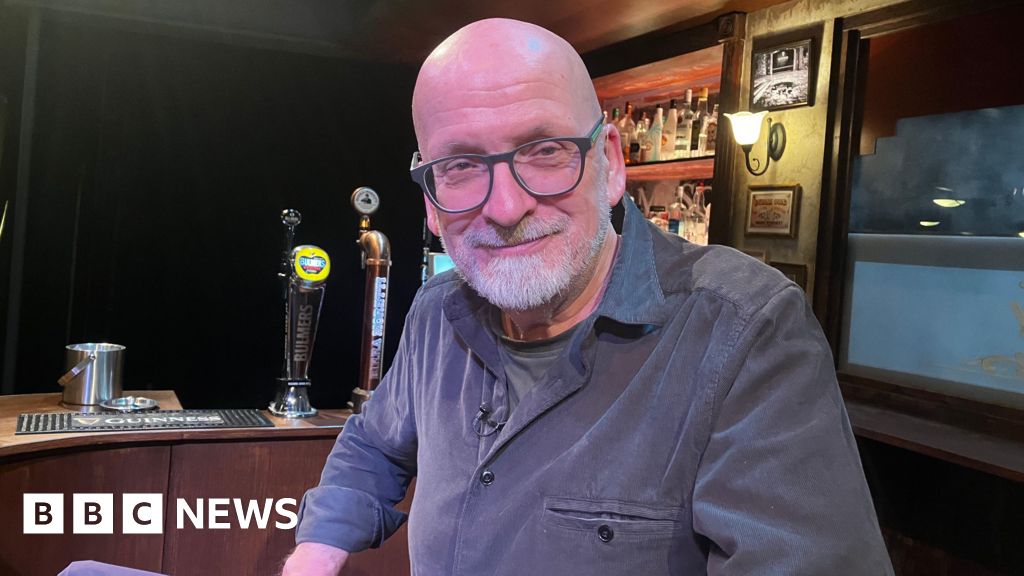

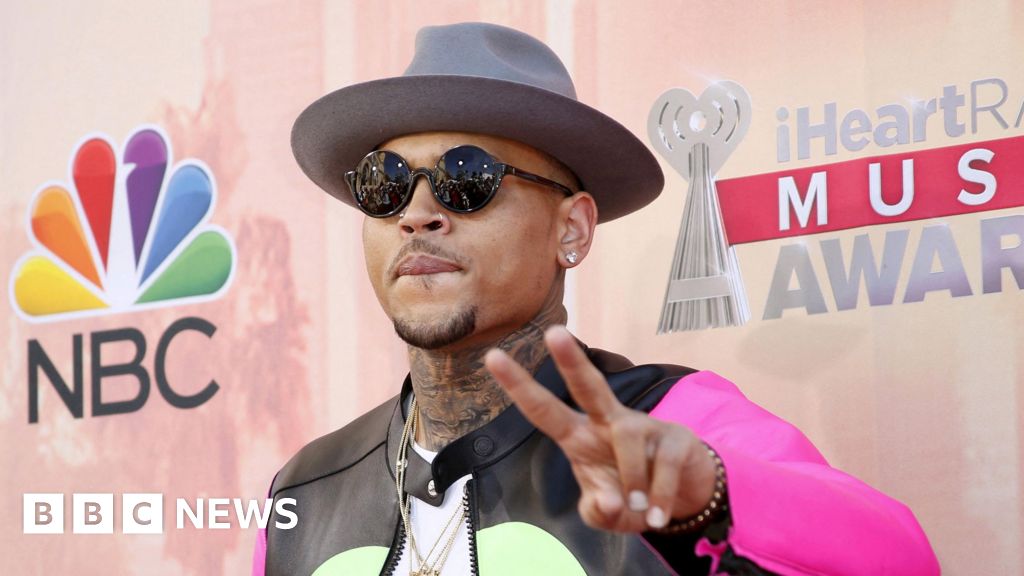





 English (US) ·
English (US) ·